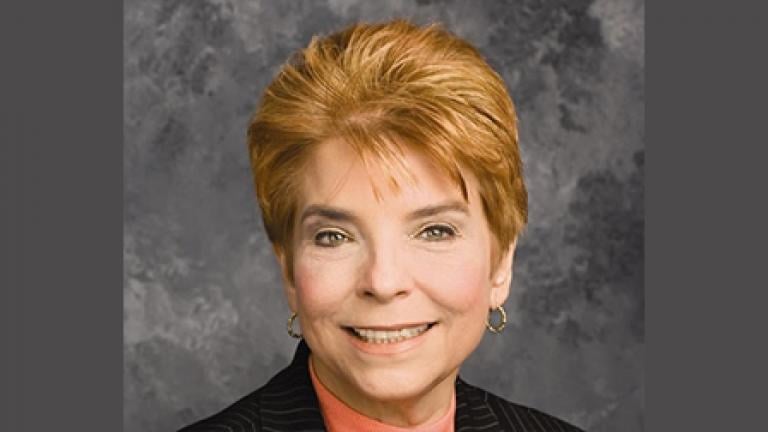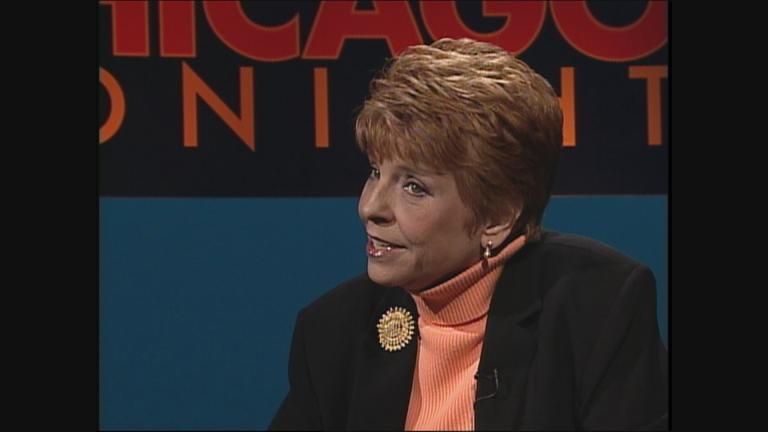 There is some clarity today on what will happen to the Illinois comptroller's office in the wake of Judy Baar Topinka's death.
There is some clarity today on what will happen to the Illinois comptroller's office in the wake of Judy Baar Topinka's death.
Illinois Attorney General Lisa Madigan weighed in on the succession process to replace Topinka as Illinois comptroller. Which governor gets to appoint her successor? Will there be a legal battle about it? And will voters eventually get to weigh in? These are questions on the minds of lawmakers today.
The circumstances are unfortunate but lawmakers may be priming for a legal battle. Madigan says the state constitution is clear to her; the relevant statute says that if the comptroller, “fails to qualify or if his office becomes vacant, the Governor shall fill the office by appointment. The appointee shall hold office until the elected officer qualifies or until a successor is elected.”
This means there are two distinct openings, one that Gov. Pat Quinn can appoint for the remainder of this term, and then one that Governor-elect Bruce Rauner will be able to appoint at the beginning of the next term.
 “You had a current comptroller who it so happens is the comptroller-elect,” Madigan said. “You have one term that ends Jan. 12, and a new term that begins on Jan. 12. On that day, Judy Baar Topinka will fail to qualify, fail to be able to take the oath of office in order to serve.”
“You had a current comptroller who it so happens is the comptroller-elect,” Madigan said. “You have one term that ends Jan. 12, and a new term that begins on Jan. 12. On that day, Judy Baar Topinka will fail to qualify, fail to be able to take the oath of office in order to serve.”
Madigan said the framers of the constitution wrote the statute the way they did because they envisioned this exact scenario playing out.
Some constitutional lawyers have interpreted the language to mean the current governor can appoint a person for the remainder of this term and the next term, and whispers have been that the governor could intend to go forward with that argument. In response to Madigan, Gov. Quinn’s office simply said, “The Governor appreciates the Attorney General’s counsel and is reviewing it.’’
At least one top lawmaker is urging that his colleagues get right back to Springfield, call a special session while the current governor is in place and vote to have a special election for comptroller in 2016. Senate President Cullerton, in a statement, said despite today’s opinion from Madigan:
“There is a clear legal dispute with many unresolved questions about the appointment authority of Governor Quinn and Governor-elect Rauner. This will undoubtedly be litigated. That reality shouldn’t stop us from recognizing the fact that voters should be allowed to elect a comptroller of their choosing in 2016. We need a special session to immediately consider legislation for a special election.”
 Governor-elect Rauner said he intends to follow Madigan’s ruling and that his appointment will be for a full four-year term.
Governor-elect Rauner said he intends to follow Madigan’s ruling and that his appointment will be for a full four-year term.
“The timing for elections of Constitutional officers is established by the Constitution, not by a statute, so a special election would be problematic. The Constitution requires that Bruce appoint a Comptroller to a four-year term and that is how we plan to proceed,” a Rauner spokesperson said.
However, Attorney General Madigan made it explicit in her opinion that an appointment should be temporary, and a special election should ultimately decide Topinka’s successor.
“The comptroller’s office is supposed to be an elected statewide office,” she said. “There is the contingency for the governor to make an appointment, but the constitutional convention makes clear when there’s going to be a large amount of time on that term, there should be and there can be a special election called.”
Quinn could choose to appoint someone with the intent that they finish out this term and serve the next term until there’s a special election, in which case there would be a legal battle between him and Rauner. Madigan said that scenario would be an unfortunate one for taxpayers.
“What you set up is a circumstance where there is unnecessary and costly litigation which is an enormous disservice to the people of the state,” she said.
 All indications are that Gov. Quinn will wait on naming a successor to Topinka until after her memorial, which takes place Wednesday morning in south suburban Countryside.
All indications are that Gov. Quinn will wait on naming a successor to Topinka until after her memorial, which takes place Wednesday morning in south suburban Countryside.
Rauner, very soon after Topinka’s death, told the media he would like Quinn to appoint Topinka’s current chief of staff who also serves on his transition team, before he decides on a long-term successor.
A lot of other names are being floated, as are calls to merge the office of comptroller and treasurer -- one office cuts the state’s checks, the other invests the state’s money -- but that would take an amendment to the state constitution.
Attorney General Lisa Madigan provided the following statement on the impact of the unfortunate passing of Judy Baar Topinka, Illinois Comptroller and Comptroller-elect:
The State now faces two issues relating to the Office of the Comptroller. First, the Office of the Comptroller is vacant due to the passing of the sitting officeholder. Second, because Comptroller Topinka was also the Comptroller-elect, her passing leaves the State without a Comptroller-elect who can begin serving as Comptroller when the new term begins January 12, 2015.
The legal analysis of these issues is based on a review of the Illinois Constitution and statutes, as well as the official documents related to the adoption of the Constitution. These documents include the official information distributed to the voters, the explanation provided by the committees that drafted the provisions, and the comments of the Constitutional Convention’s delegates.
The language of the Constitution and the official documents related to its adoption address both of the issues.
Article V, section 7 states:
If the Attorney General, Secretary of State, Comptroller or Treasurer fails to qualify or if his office becomes vacant, the Governor shall fill the office by appointment. The appointee shall hold office until the elected officer qualifies or until a successor is elected and qualified as may be provided by law and shall not be subject to removal by the Governor.
As this language makes clear, the Constitution details two distinct scenarios in which the Governor is authorized to fill the Office of Comptroller with an appointee – when the Comptroller-elect “fails to qualify” and when the Comptroller’s “office becomes vacant.” An officer-elect, such as the Comptroller-elect, “fails to qualify” to begin serving in office when, for example, he or she is unable to take the oath of office.
In addition to the language of section 7 of the Constitution, it is clear from the report of the committee drafting this section and the debates of the delegates that they considered a failure to qualify for an office to be separate and apart from a vacancy in office. The committee report and debates establish that the drafters specifically anticipated and directly addressed the unfortunate situation the state faces with the passing of the incumbent Comptroller who is also the Comptroller-elect by adding the phrase “fails to qualify” to section 7 and, as a result, authorizing the Governor to make an appointment.
Based on the language in the Constitution and the discussion during the drafting, it is my conclusion that a vacancy takes place when an officer is serving in the office and can no longer continue to do so, such as here, where the Comptroller has passed away while in office. A failure to qualify, on the other hand, will not occur until an officer-elect cannot be sworn in and thus qualify to begin serving.
Thus, the death of Comptroller Topinka creates a vacancy that the Constitution authorizes Governor Quinn to fill.
Because Judy Baar Topinka was also the Comptroller-elect, she will not be able to take the oath of office on January 12, 2015. As a result, on that date she will fail to qualify to serve as Comptroller. At that time, the sitting Governor – current Governor-elect Rauner – will be authorized by the Constitution to appoint a successor to hold the office.
Although the current vacancy in the Comptroller’s office and the anticipated failure of the Comptroller-elect to qualify to begin serving in office on January 12, 2015, are both the result of the passing of Judy Baar Topinka, the Constitution treats them as separate events – one occurring immediately in the passing of the current Comptroller and the other occurring when the Comptroller-elect will be unable to be sworn into office and qualify to begin serving the term that starts on January 12, 2015. In each case, the sitting Governor has the authority to make an appointment to fill the Office of Comptroller. In this situation, Governor Quinn has the authority to fill the current vacancy and Governor-elect Rauner, once he is sworn into office, will have the authority to make an appointment to fill the Comptroller’s office due to the failure of the Comptroller-elect to qualify.
Further, while the current law allows an unelected Comptroller to serve in office for four years without the approval of Illinois voters, it is a fundamental principle in a democracy that the people should elect the officers who represent them. Although the drafters of the 1970 Constitution provided that the Governor should fill the office of Comptroller with an appointee in certain circumstances, they also recognized and ensured that the General Assembly could choose to provide by law for a special election when an appreciable time remains in an uncompleted term.
The State is now facing the undemocratic circumstance in which an appointee could serve the Comptroller’s full four-year term, notwithstanding that there is a statewide election in 2016 that could provide the voters with the opportunity to elect a successor to serve half of the term.
I urge Governor Quinn, Governor-Elect Rauner, the legislative leaders and the members of the General Assembly to support and move forward with a new law allowing the people of Illinois to vote, at the next regularly scheduled statewide election in 2016, to determine who will serve as Comptroller until the 2018 election.
Governor-elect Bruce Rauner issued the following statement in response:
“It is unfortunate we are even having this discussion less than a week following Judy’s death - now is a time we should be honoring her legacy.
I appreciate Attorney General Madigan’s thoughtful and thorough review of this matter. There is now clear bi-partisan agreement that the legal question is settled: there are two appointments – one to fulfill the remainder of Comptroller Topinka’s term and another to fulfill the term to which Judy was elected on November 4th.
With less than a month remaining in the current term, I continue to believe the best course of action for the people of Illinois is to maintain continuity in the office and respect the wishes of the Topinka family.”








